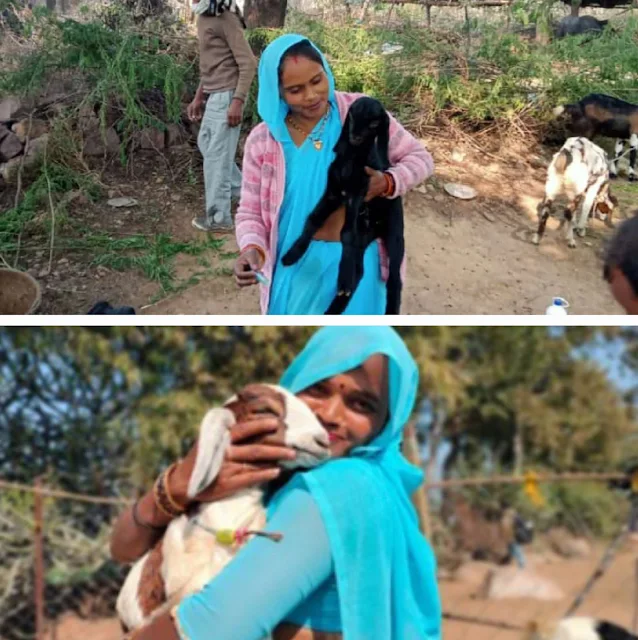While buffaloes and cows often receive greater attention in animal husbandry-related government development schemes, goats remain vital for poorer households. Therefore, enhancing goat-based livelihoods is especially important for marginalized communities—particularly when such efforts reduce villagers' costs and lower goat mortality rates. One promising strategy involves training local villagers, especially women, to provide essential veterinary services. A welcome byproduct of this is that several women gain a respected source of income within their own villages.
Take the story of Bharti Aharwar, a Dalit woman from Nadia village in Tikamgarh district, Madhya Pradesh. Facing mounting economic challenges, she watched her husband migrate to Delhi in search of work, but no stable solution emerged. When Bharti learned from a SRIJAN activist about a program to train rural women in goat healthcare, she eagerly enrolled. The training, conducted by the Lucknow-based Goat Trust, covered treatment of common diseases, vaccination, and nutrition, leaving Bharti newly confident.
Armed with a medicine kit and a crisp new uniform, Bharti began visiting households in need of goat care. Although excited, she initially faced resistance from family members and neighbors, many of whom disapproved of her going door-to-door for a modest fee—sometimes as little as ₹10. Nevertheless, Bharti persevered. Her success in treating animals quickly earned the respect of her community, where she and her peers became affectionately known as pashu sakhis (friends of animals). This recognition grew further as she organized goat health camps focusing on vaccination and deworming.
Villagers came to see the immense value of having a local para-vet available at low cost. Goats in the area had long suffered from rapidly spreading diseases like FMD and PPR. With Bharti’s help, preventive care became more accessible.
A local farmer producer organization facilitated timely access to both medicines and nutritious feed, often prepared by women in the group. Bharti also sells this feed, earning a small commission. Of course, she can now also provide better care to her own family’s goats. With her new income—over ₹60,000 annually—Bharti has improved her children's educational prospects.
Another inspiring figure is Maya Ghosh, one of the first pashu sakhis in the district. After completing her training, she conducted a local survey showing that nearly 90% of families in her village, Bijrawan, rear goats—typically 5 to 10 per household. Clearly, goats play a crucial role in the livelihoods of small and marginal farmers.
This initiative began in Tikamgarh with just 10 pashu sakhis, but it soon gained momentum. The number of trained para-vets has since grown to around 76, with even initial skeptics in government circles acknowledging its success.
The outcomes are twofold. First, with disease posing a major threat to goats, this model has strengthened the viability of goat-based livelihoods. Second, it has empowered rural women, earning them recognition for their skills and contributions. According to Rakesh Kumar Singh, SRIJAN’s coordinator in Tikamgarh, the speed and depth of learning among the pashu sakhis exceeded expectations.
The path ahead involves making more effective use of existing government schemes, especially those aimed at Scheduled Castes and Tribes, to further enhance goat-rearing livelihoods.
A similar initiative in Shivpuri district, also led by SRIJAN, has yielded additional gains. This program emphasizes five key aspects:
1. Better goat housing – with protection from weather and improved hygiene, including separate shelter for goat kids (memnas) to shield them from harm.
2. Nutritious feed – locally prepared by women-led producer organizations, with better feeding practices to ensure cleaner, dust-free food.
3. Improved breeds – prioritizing regional breeds over cross-breeding.
4. Better marketing – to improve earnings from goat-rearing.
5. Focused healthcare – expanding the pashu sakhi model for timely and effective treatment.
Seema Jatav, one of the more experienced pashu sakhis, regularly trains new recruits and maintains a nutrition garden. A proponent of natural farming, she also supports training in sustainable agriculture.
Similarly, Manisha Lodhi—who holds a master’s degree in social work—manages a bio-resource center on her farm, sews at night, and helps run a family shop. Despite her many responsibilities, Manisha and other pashu sakhis express pride and joy in their expanded social roles and the recognition they now receive.
This, in essence, is Indian village-style women’s empowerment: balancing household duties with community service and growing social leadership.
Through such efforts, a healthier and more sustainable model of goat-based livelihoods is gradually taking root—one that uplifts both animals and the women who care for them.
---
The writer is Honorary Convener, Campaign to Save Earth Now. His recent books include Man over Machine, A Day in 2071, Saving Earth for Children, and Planet in Peril


Comments